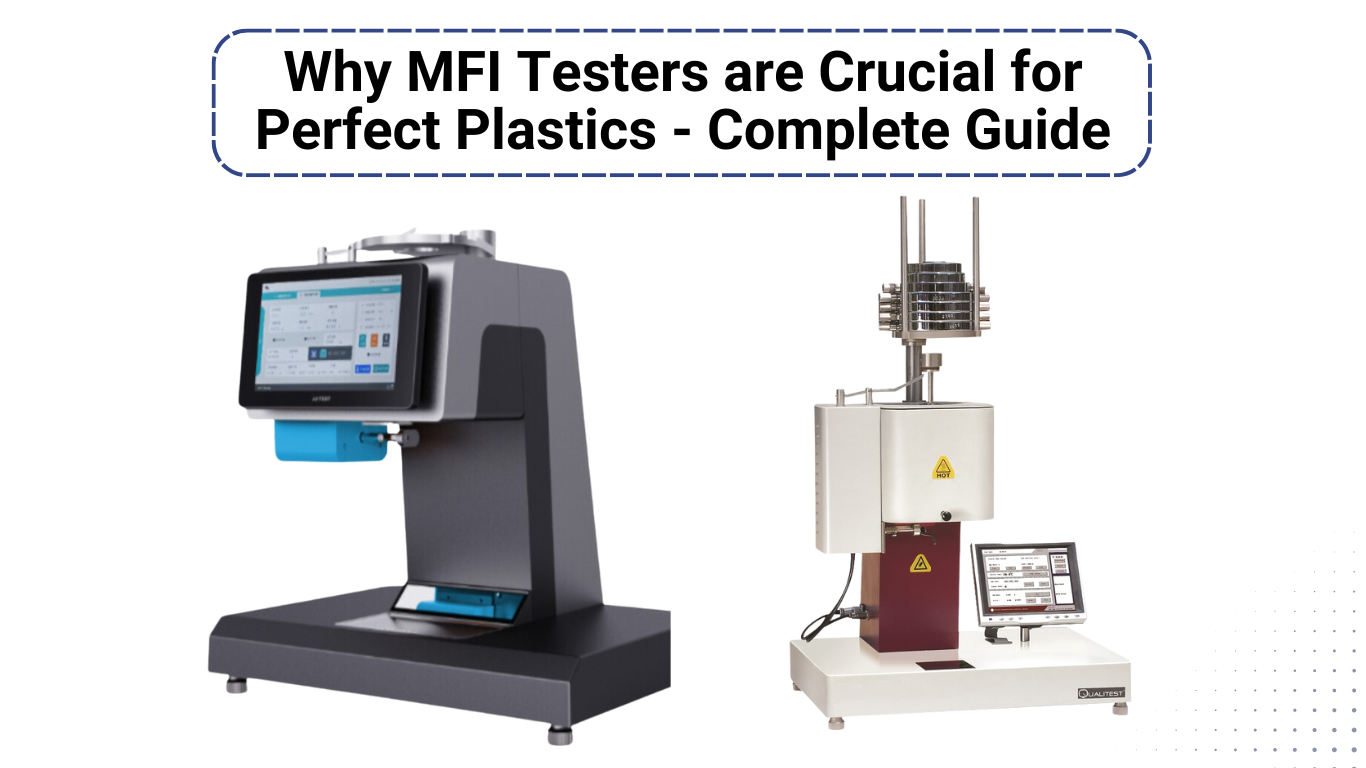Have you ever wondered how a plastic bottle goes from a molten blob to the perfectly shaped container you use every day? The answer lies not in magic, but in a powerful quality control tool: the Melt Flow Tester (MFI Tester) also known as the Melt Flow Indexer (MFI). This device is indispensable for Quality Control Managers, Laboratory Managers, R&D Engineers, and Process Engineers across various sectors, including plastic manufacturing, polymer production, packaging, and consumer goods. In this blog post, we’ll explore what a Melt Flow Tester is, how it works, and why it is essential for maintaining the quality and performance of materials.
What is a Melt Flow Tester?
A Melt Flow Tester, or MFI Tester, is a device used to measure the melt flow rate (MFR) of thermoplastic polymers. The melt flow rate is a measure of the ease of flow of the molten polymer and is expressed in grams per 10 minutes. This measurement provides valuable information about the viscosity and molecular weight of the polymer, which are critical parameters for quality control and process optimization.
How Does a Melt Flow Tester Work?
The Melt Flow Indexer operates by extruding a molten polymer through a die under controlled conditions of temperature and pressure. The procedure typically involves the following steps:
- Preheating the Polymer: The polymer sample is placed in a heated barrel and allowed to reach the specified testing temperature.
- Applying Load: A specified weight is applied to the polymer to create pressure, forcing the molten material through the die.
- Measuring Flow Rate: The amount of polymer extruded in a set period (usually 10 minutes) is collected and weighed to determine the melt flow rate.
The results from the MFI Tester help engineers and quality control professionals understand the flow characteristics of the polymer, which is essential for determining its suitability for various applications.
Importance of Melt Flow Testing in Various Industries
- Plastic Manufacturing: In plastic manufacturing, the MFI Tester is crucial for ensuring that the raw materials meet the required specifications for processing. It helps manufacturers select the right polymer grades and optimize processing parameters to produce high-quality plastic products. Consistent melt flow rates indicate stable polymer properties, leading to fewer defects and higher production efficiency. Exploring more about plastic testing equipment can provide deeper insights into material performance, ensuring that the final products meet the highest industry standards.
- Polymer Production: For polymer producers, maintaining consistent melt flow rates is essential for product quality and performance. The MFI Tester allows them to monitor and control the polymerization process, ensuring that the final product has the desired molecular weight distribution and viscosity. This is particularly important for applications where specific mechanical properties are required.
- Packaging: In the packaging industry, the melt flow rate of polymers affects the processing and performance of films, bottles, and other packaging materials. Quality Control Managers rely on MFI Testers to ensure that the polymers used in packaging meet the necessary standards for strength, flexibility, and durability. This ensures that the packaging materials protect the contents effectively and maintain their integrity throughout their lifecycle.
- Consumer Goods: The quality of consumer goods, such as toys, household items, and electronics, is heavily dependent on the properties of the polymers used. Melt flow testing helps manufacturers ensure that the polymers used in these products have the right flow characteristics for molding and extrusion processes. This leads to high-quality, reliable products that meet consumer expectations.
The Role of MFI Testers in Quality Control
Quality Control Managers and Laboratory Managers use MFI Testers as part of their routine testing procedures to ensure that raw materials and finished products meet the required standards. The data obtained from melt flow testing helps in:
- Identifying Material Consistency: Regular testing ensures that the polymer batches are consistent, reducing variability in production.
- Detecting Contaminants: Variations in melt flow rates can indicate the presence of contaminants or degradation in the polymer.
- Optimizing Processing Conditions: Understanding the flow behavior of polymers allows engineers to fine-tune processing parameters for optimal performance.
- Ensuring Compliance: Melt flow testing is often required to comply with industry standards and regulations, ensuring that products meet safety and quality requirements.
Choosing the Right Melt Flow Tester
When selecting a Melt Flow Indexer, it is essential to consider factors such as accuracy, ease of use, and compliance with industry standards. Qualitest North America is a leading provider of high-quality MFI Testers that meet the stringent requirements of various industries. Their advanced instruments offer precise measurements, user-friendly interfaces, and robust construction, making them ideal for use in quality control labs and production facilities.
Summary
In conclusion, the Melt Flow Tester is an invaluable tool for Quality Control Managers, Laboratory Managers, R&D Engineers, and Process Engineers in industries such as plastic manufacturing, polymer production, packaging, and consumer goods. By providing critical insights into the flow properties of polymers, MFI Testers help ensure the quality and performance of materials, leading to better products and more efficient processes. Investing in a reliable Melt Flow Indexer from a trusted supplier like Qualitest North America can significantly enhance your quality control efforts and contribute to the overall success of your operations.
Read more from techbullion



































